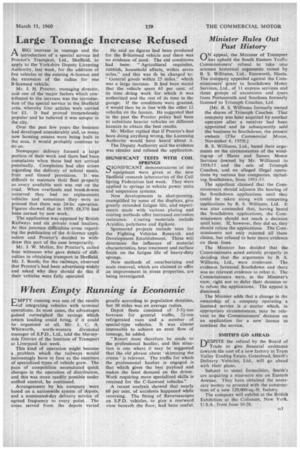Large Tonnage Increase Refused
Page 57

If you've noticed an error in this article please click here to report it so we can fix it.
ABIG increase in tonnage and the introduction of a special service led Proctor's Transport, Ltd., Sheffield, to apply to the Yorkshire Deputy Licensing Authority, last week, for the addition of five vehicles to the existing A-licence and the extension of the radius for one B-licensed vehicle.
Mr. J. H. Proctor, managing director, said one of the major factors which contributed to the increase was the introduction of the special service in the Sheffield area, whereby four articles were carried for £1. It had proved tremendously popular and he believed it was unique in the city.
Over the past few years the business had developed considerably and, as many new housing estates were being built in the area, it would probably continue to do so.
Newspaper delivery formed a large portion of their work and there had been complaints when these had not arrived punctually. Complaints had also arisen regarding the delivery of school meals, fruit and tinned provisions. It was difficult to maintain their fleet properly as every available unit was out on the road. When overhauls and breakdowns occurred they had no replacement vehicles and sometimes they were so pressed that there was 24-hr. operation. Figures showed that in 1959, £8,370 had been earned by new work.
The application was opposed by British Railways and six private road hauliers. At this juncture difficulties arose regarding the publication of the A-licence application and Proctor's decided to withdraw this part of the case temporarily.
Mr. J. W. Mellor, for Proctor's, called four witnesses who gave details of difficulties in obtaining transport in Sheffield. Mr. J. Booth, for the railways, observed that Proctor's had been advertising widely and asked why they should do this if their vehicles were fully operated. He said no figures had been produced for the B-licensed vehicle and there was no evidence of need. The old conditions had been: "Agricultural requisites, rubbish, household effects, within seven miles," and this was tb be changed to: " General goods within 25 miles," which was a large increase. It had been stated that the vehicle spent 65 per cent. of its time doing work for which it was authorized and the rest of its time in the garage. If the conditions were granted, it would then he in line with the other 12 vehicles on the licence. He suggested that in the past the Proctor policy had been to substitute heavier vehicles on different licences to obtain the best results.
Mr. Mellor replied that if Proctor's had been doing anything wrong, the Licensing Authority would have heard about it.
The Deputy Authority said the evidence was slender and refused the application.
SIGNIFICANT TESTS WITH COIL SPRINGS
SIGN IFICANT demonstrations of test equipment were given at the new Slieffield research laboratories of the Coil Spring Federation last week. They were applied to springs in vehicle power units and suspension systems.
New developments in shot-peening, exemplified by some of the displays, give greatly extended fatigue life, and experiments made with various plating and coating methods offer increased corrosion resistance. Coating materials include Araldite, polythene and Epikote.
Sponsored projects include tests for the Fighting Vehicles Research and Development Establishment. These will determine the influence of material characteristics, heat treatment and surface finish on the fatigue life of heavy-duty springs.
New methods of recarburizing and scale removal, which are claimed to offer an improvement in stress properties, are being investigated.




































































































































